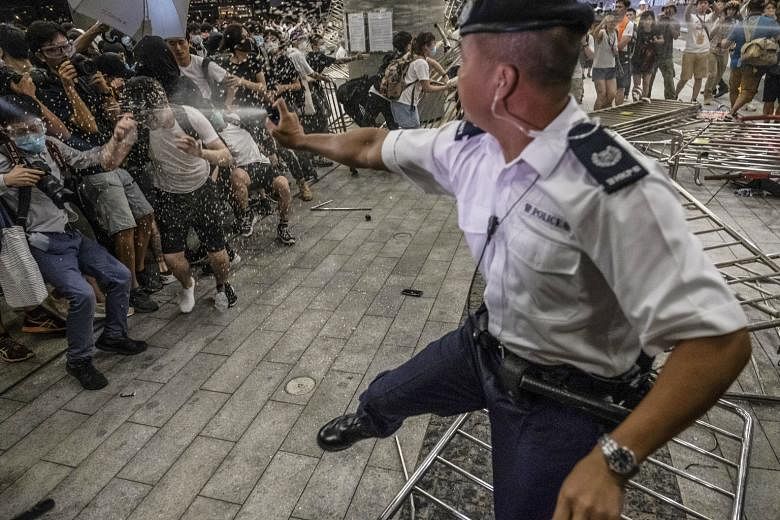LONDON • Britain urged an independent investigation into the violence against protesters in Hong Kong opposed to an extradition Bill, warning yesterday that the fate of its former colony would be a litmus test for China.
Millions of people have clogged the streets of the Asian financial centre this month to rally against the extradition Bill, which would allow people to be extradited to the mainland to face trial in courts controlled by the Communist Party.
Hong Kong police fired rubber bullets and tear gas at protesters who hurled bricks and tried to storm the grounds of the legislature on June 12.
"I today urge the Hong Kong... government to establish a robust, independent investigation into the violent scenes that we saw," Foreign Secretary Jeremy Hunt said in Parliament.
"The outcome of that investigation will inform our assessment of future export licence applications to the Hong Kong police and we will not issue any further export licences for crowd control equipment to Hong Kong unless we are satisfied that concerns raised on human rights and fundamental freedoms have been thoroughly addressed."
The last UK export licence for tear-gas hand grenades and tear-gas cartridges for Hong Kong police to use in training was issued in July last year, the Foreign Office said earlier this month. The last export licence for rubber bullets was in July 2015 while an open licence for riot shields was rejected in April this year.
Hong Kong has a separate Constitution from China called the Basic Law and its legal systems are based on English Common Law. Under the "one country, two systems" formula, Hong Kong gets to retain for 50 years after the 1997 handover most of its autonomy and freedoms, including freedom to protest and a much cherished independent judiciary.
"We will stand by that agreement and we expect China to do the same," Mr Hunt said. "What happens in Hong Kong is, I think for all of us, a litmus test of the direction of travel that China goes in."
"The fundamental freedoms of Hong Kong are what have made it such a stunning success since 1997 and indeed before 1997 - anything that contradicted the letter or spirit of the Basic Law that preserves them should not happen," Mr Hunt added.
The 30,000-member Hong Kong police force, which was long known as "Asia's finest", is now struggling to salvage its reputation blighted by its behaviour in the June 12 protests.
That day, thousands of protesters surrounded the city's legislature to prevent lawmakers from discussing the Bill. But when some protesters threw bricks and tried to storm the grounds of the legislature, officers fired tear gas at the crowds, and also used rubber bullets for the first time in decades. More than 80 people were injured, including law enforcement officers. Thirty-two people were arrested, eight of whom were released unconditionally on June 18.
Senior government and police officials have defended the department's performance, saying that it is merely upholding the rule of law.
But pro-democracy opposition leaders are seeking to turn the police into a potent symbol of how the Hong Kong authorities are accountable not to the public, but Beijing.
Critics of the police's conduct have created open-source databases in which users share officers' phone numbers and the names of their spouses and high schools on social media, with some lists referring to the police as dogs.
"This is immoral," said Mr Lam Chi Wai, chairman of the Junior Police Officers' Association, a police union. "There are people saying that bloodshed is needed to repay bloodshed."
REUTERS, NYTIMES










